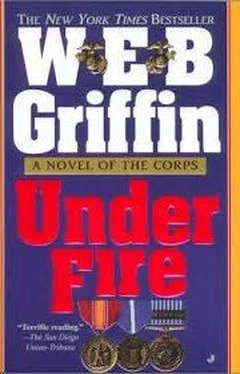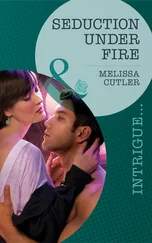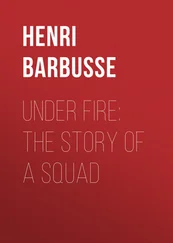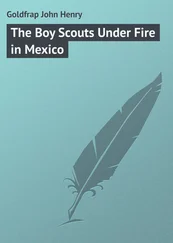Griffin W.E.B. - The Corps 09 - Under Fire
Здесь есть возможность читать онлайн «Griffin W.E.B. - The Corps 09 - Under Fire» весь текст электронной книги совершенно бесплатно (целиком полную версию без сокращений). В некоторых случаях можно слушать аудио, скачать через торрент в формате fb2 и присутствует краткое содержание. Год выпуска: 0101, Жанр: Старинная литература, на английском языке. Описание произведения, (предисловие) а так же отзывы посетителей доступны на портале библиотеки ЛибКат.
- Название:The Corps 09 - Under Fire
- Автор:
- Жанр:
- Год:0101
- ISBN:нет данных
- Рейтинг книги:5 / 5. Голосов: 1
-
Избранное:Добавить в избранное
- Отзывы:
-
Ваша оценка:
- 100
- 1
- 2
- 3
- 4
- 5
The Corps 09 - Under Fire: краткое содержание, описание и аннотация
Предлагаем к чтению аннотацию, описание, краткое содержание или предисловие (зависит от того, что написал сам автор книги «The Corps 09 - Under Fire»). Если вы не нашли необходимую информацию о книге — напишите в комментариях, мы постараемся отыскать её.
The Corps 09 - Under Fire — читать онлайн бесплатно полную книгу (весь текст) целиком
Ниже представлен текст книги, разбитый по страницам. Система сохранения места последней прочитанной страницы, позволяет с удобством читать онлайн бесплатно книгу «The Corps 09 - Under Fire», без необходимости каждый раз заново искать на чём Вы остановились. Поставьте закладку, и сможете в любой момент перейти на страницу, на которой закончили чтение.
Интервал:
Закладка:
"I've always felt," Captain Jones-Fortin said, "that this sort of thing is best handled by a competent petty officer; that the only thing an officer attempting to supervise the accomplishment of something about which he knows very little does is to create confusion."
"How about `chaos,' sir?" McCoy replied.
"The voice of experience, Captain?" Jones-Fortin asked dryly.
"Unfortunately," McCoy said. "I can still remember some spectacular examples from my days as a corporal."
The chief jumped nimbly into one of the lifeboats, started its engine, motioned for two of the Marines stand-ing on the deck to get into the boat, waited until they were in it, sitting where he thought they should be sitting, and then he nimbly moved to the second boat and-this time with some difficulty-got the engine started.
He motioned for the other two Marines on deck to get into the boat, seated them, then looked up toward the flying bridge.
"We seem to be ready for the officers, Captain," he called, in a deep voice that did not need the amplification of a bullhorn.
"They will be down directly," Jones-Fortin called. "Good show, Chief!"
Jones-Fortin offered his hand first to Taylor and then to McCoy.
"Best of luck," he said. "We'll see you again soon."
The chief watched from the deck as Taylor-nimbly-and McCoy-very carefully-both got into one boat.
Taylor checked McCoy out on the engine controls again, then signaled to the chief to let loose the lines. Then, very carefully, he took the tiller and moved the boat alongside the second.
"Just follow me, Ken," he said. "You steered the Wind of Good Fortune-you can steer this."
McCoy nodded and took the tiller.
Taylor jumped into the second boat, signaled for its lines to be let loose, and then shoved it away from Charity's hull with a shove with his foot. Then he took the tiller, ad-vanced the throttle, and moved away from Charity.
McCoy waited until ten feet separated the boats, then advanced his throttle.
The floodlights went out a moment later. It took Mc-Coy's eyes what seemed like a very long time to adjust to the darkness. When they had, he saw that Taylor's boat was getting farther away.
He eased the throttle forward a hair.
Moments after that, Jones-Fortin's amplified voice called, "Godspeed, gentlemen!" across the darkness.
When McCoy looked over his shoulder, he could barely see HMS Charity.
Thirty minutes later, a bump on the just barely visible hori-zon changed slowly into the lighthouse at the entrance to the Flying Fish Channel.
And thirty minutes after that-by then it was light-the houses on the shore of Tokchok-kundo came into view. As they came closer, the damage the storm had caused became visible.
The roofs of two of the houses were gone, and the doors and windows of most of them.
They were almost at the wharf before anyone appeared, and then it was Master Gunner Ernest W. Zimmerman, USMC.
He stood on the wharf and saluted as Lieutenant Taylor skillfully brought his lifeboat up it, and managed to keep a straight face when the boat conned by Captain McCoy rammed into Taylor's boat, knocking Taylor off his feet.
Chapter Nineteen
[ONE]
THE DAI-ICHI BUILDING
TOKYO, JAPAN
0905 20 AUGUST 1950
The two-starred red flag of a major general flew from a small staff on the right front fender of the glistening olive-drab Buick staff car. Even before it stopped before the main entrance of the Dai Ichi Building, a captain of what was usually referred to as the Honor Guard-or, less re-spectfully, as the Palace Guard, and, even less respectfully, as the "Chrome Domes"-sent two members of the guard trotting quickly down the stairs so they would be in posi-tion to open the staff car's doors when it stopped.
The "Chrome Domes" appellation made reference to the chrome-plated steel helmets worn by the troops who guarded the headquarters of the Supreme Commander, and the Supreme Commander himself. The rest of their uni-forms were equally splendiferous. They wore infantry blue silk scarves in the open necks of their form-fitting and stiffly starched khaki shirts. Their razor-creased khaki trousers were "bloused" neatly into the tops of glistening parachutist's boots. This was accomplished by using the weight of a coiled spring inside the leg to hold the trousers in place.
Not all of the Chrome Domes were parachutists entitled to wear Corcoran "jump" boots. The basic criteria for their selection was that they be between five feet eleven and six feet one in height, between 165 and 190 pounds in weight, and possessed of what the selection officers deemed to be a military carriage and demeanor.
The standard-issue boot for nonparachutists was known as the "combat boot." It consisted of a rough-side-out ankle-high shoe, to which was sewn a smooth-side-out up-per with two buckles.
The combat boot was practical, of course, but the rough-side-out boot was difficult to shine, and it was not really suited to be part of the uniform of the elite troops selected to guard the Supreme Commander and his headquarters, and jump boots were selected to replace them.
The brown laces of the Corcoran boots were also re-placed, with white nylon cord salvaged from parachutes no longer considered safe to use. The "laces" were worn in an elaborate crossed pattern.
Officers of the Palace Guard wore Sam Browne leather belts, which had gone out of use in the U.S. Army in the early days of World War II. Enlisted members of the Chrome Domes wore standard pistol belts, but they were painted white, as were the accoutrements thereof-the leather pistol holster, and two pouches for spare pistol magazines.
The Buick stopped. The doors were opened, and three men got out. One of them was Colonel Sidney Huff, senior aide to General Douglas MacArthur. He was in his usual splendidly tailored tropical worsted tunic and blouse, from which hung all the especial insignia decreed for the uni-form of an aide-de-camp to a five-star general. Colonel Huff was not armed.
The second man out of the Buick was wearing some-what soiled fatigues and mud-splattered combat boots, into which the hem of his trousers had not been stuffed. The chevrons of a master sergeant were sewn to his sleeves. He was armed with a Model 1928 Thompson.45 ACP caliber submachine gun and a Model 1911A1 Pistol, Caliber.45 ACP, worn in a shoulder holster. The pockets of his fatigue jacket bulged with spare magazines for both weapons.
The third man was dressed identically to the master ser-geant-including jacket pockets bulging with spare maga-zines-with these exceptions: He was carrying a submachine gun, M3, caliber.45 ACP, instead of a Thomp-son. The M3, developed in World War II, was built cheaply of mostly stamped parts, and was known as a "grease gun" because it looked like a grease gun. And instead of chevrons indicating enlisted rank, there were two silver stars on each of his fatigue jacket collar points.
Major General Ralph Howe, NGUS, returned the salute of the Chrome Dome holding open his door and started to follow Colonel Huff up the stairs and into the Dai Ichi Building. Master Sergeant Charley Rogers brought up the rear.
Standing just outside the door itself were six more Chrome Domes and the Chrome Dome officer, already saluting, and two more were holding the door itself open.
"Perhaps," Colonel Huff said, in the Supreme Commander's outer office, "it would be best if you left your weapons with your sergeant."
"Colonel, I really hadn't planned to shoot General MacArthur," Howe said. He handed Rogers the grease gun, but made no move with regard to his pistol.
"Colonel, how about seeing if you can have someone send something up here for Charley to eat? Neither one of us could handle the powdered eggs they were feeding at K-l."
Huff's face tightened.
Читать дальшеИнтервал:
Закладка:
Похожие книги на «The Corps 09 - Under Fire»
Представляем Вашему вниманию похожие книги на «The Corps 09 - Under Fire» списком для выбора. Мы отобрали схожую по названию и смыслу литературу в надежде предоставить читателям больше вариантов отыскать новые, интересные, ещё непрочитанные произведения.
Обсуждение, отзывы о книге «The Corps 09 - Under Fire» и просто собственные мнения читателей. Оставьте ваши комментарии, напишите, что Вы думаете о произведении, его смысле или главных героях. Укажите что конкретно понравилось, а что нет, и почему Вы так считаете.










